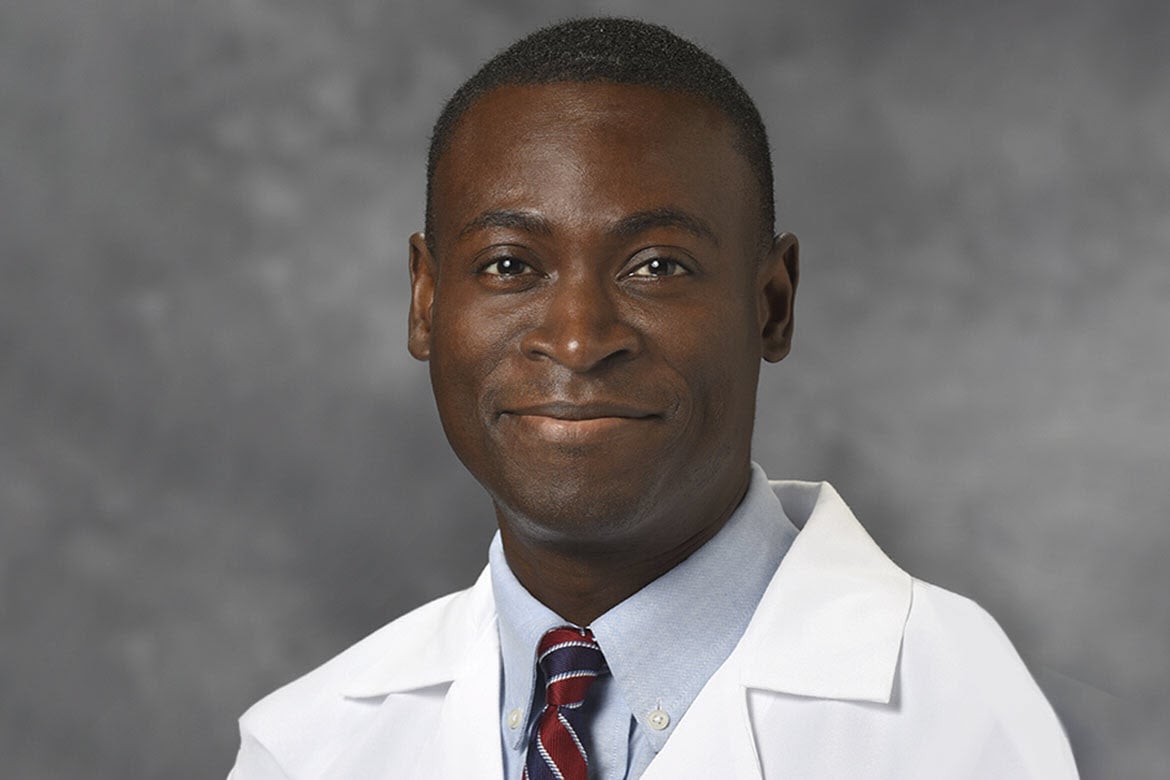As a medical student, do you ever wonder what it’s like to specialize in vascular medicine? Meet Olusegun Osinbowale, MD, a vascular medicine physician and a featured doctor in the AMA’s “Shadow Me” Specialty Series, which offers advice directly from physicians about life in their specialties. Check out his insights to help determine whether a career in vascular medicine might be a good fit for you.
The AMA Specialty Guide simplifies medical students’ specialty selection process, highlights major specialties, details training information, and provides access to related association information. It is produced by FREIDA™, the AMA Residency & Fellowship Database®.
Learn more with the AMA about the medical subspecialty of vascular medicine, which may be entered through cardiology, internal medicine, interventional radiology or vascular surgery.
“Shadowing” Dr. Olusegun Osinbowale
Specialty: Vascular medicine.
Practice setting: Multispecialty group practice.
Employment type: Employed by Henry Ford Health in Detroit. Henry Ford Health is a member of the AMA Health System Program, which provides enterprise solutions to equip leadership, physicians and care teams with resources to help drive the future of medicine.
Years in practice: 15.
A typical day and week in my practice: A typical day involves patient care in an ambulatory setting. I spend 45–50 hours per week on direct patient care and another several hours on indirect care, administrative tasks and continuing medical education.
The most challenging and rewarding aspects of vascular medicine: Vascular care must be tailored to individual needs. Challenges often present themselves in coordination of care and cost coverage of necessary treatment.
One of the rewarding aspects of vascular medicine is that vascular conditions are usually reliably quantifiable. Also, practical outcomes are achievable when conditions are detected before the latter stages of severity.
The impact burnout has on vascular medicine: It is a niche specialty that, unfortunately, is not immune to burnout, depending on one’s practice type and location. Certain specialties are under-represented geographically or may be more subjected to social determinants of health effects that are out of the physician’s control, leading to challenges in achieving ideal outcomes.
How Henry Ford Health is reducing physician burnout: Henry Ford Health offers resources to identify and mitigate physician burnout through mentoring and counseling.
How my lifestyle matches, or differs from, what I had envisioned: The lifestyle equation is in constant flux, especially due to the pace of change in technology, care delivery, continuing education and credentialing requirements. The same technology that has improved access to patient records and relevant medical publications also increases the burden of inadequately reimbursed virtual or indirect patient care. It also presents challenges in staying up to date with frequent changes in guideline-directed management and maintaining work-life balance.
Skills every physician in training should have for vascular medicine but won’t be tested for on the board exam: Trainees should cultivate open-mindedness. They should consider that there are often numerous possible clinical pathways, and care may overlap several specialties. Furthermore, the role of social determinants of health cannot be overstated.
One question physicians in training should ask themselves before pursuing vascular medicine: Am I willing to commit, scientifically or otherwise, to contributing to my field of interest beyond normal working hours, or would rather pursue other interests with my occasional free time?
Books, podcasts or other resources every medical student interested in vascular medicine should be reading: There are many textbooks and other forums that contain valuable context. Some that I would suggest include the current editions of:
- Cecil Essentials of Medicine, edited by Edward J. Wing MD, and Fred J. Schiffman MD, to establish a broad foundation in general medical knowledge.
- Introduction to Vascular Ultrasonography, edited by John S. Pellerito, MD, and Joseph F. Polak, MD, for diagnostic evaluation of vascular disease.
- Rutherford’s Vascular Surgery and Endovascular Therapy, edited by Anton N. Sidawy, MD, and Bruce A. Perler, MD, for familiarity with advanced vascular disease and procedural interventions.
Additional advice I would give to students who are considering vascular medicine: Most specialties follow treatment guidelines and accreditation standards that are dynamic because of ongoing research, technological innovations and interplay with population trends. Vascular medicine is a niche specialty that requires as much lifelong learning, adaptability and creative thought as any other subspecialty.




